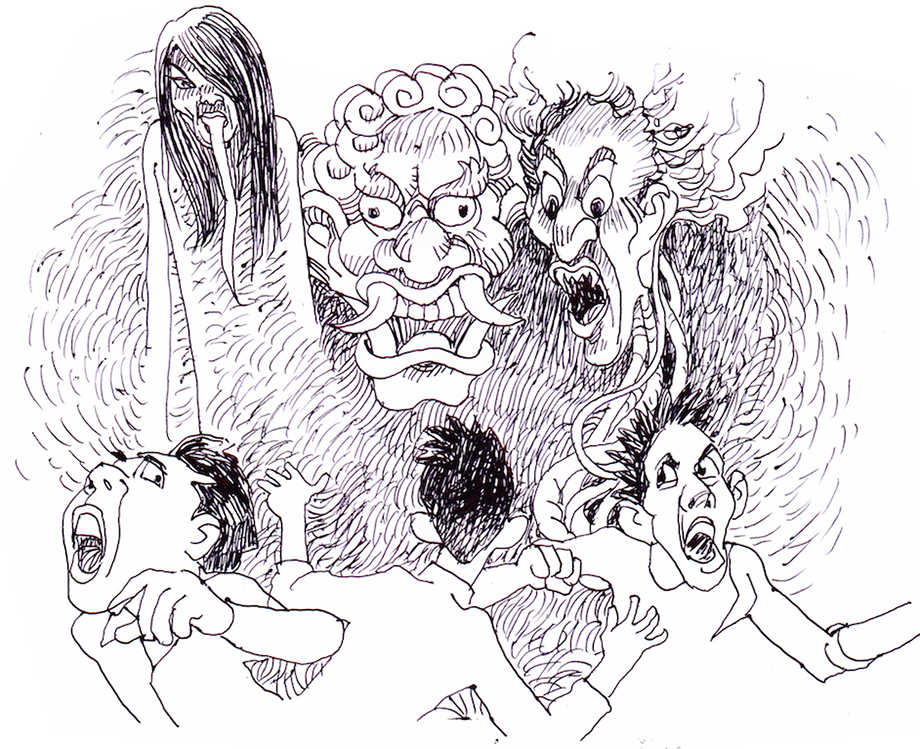By Samatha Pak
Northwest Asian Weekly

A model holding a copy of “Looking After the Ashes” (Image provided by Kopi Soh)
Halloween is a time for ghosts, ghouls, and other things that go bump in the night.
And while the holiday is observed more in the Western world, superstitions, old wives’ tales, and taboos are universal—and every culture has its own stories.
Growing up in Malaysia, Kopi Soh was surrounded by them: If you eat while laying down, you’ll turn into a snake. Eat all your rice, or your future husband’s face will be full of pimples and pockmarks. If you swallow watermelon seeds, a watermelon plant will grow out of your mouth.
Don’t play by storm drains or else you’ll be confronted by a big-breasted woman with the power to doom you.
In her book, “Looking After the Ashes” (2021), a semi-biographical fictional story available to purchase on Amazon, Kopi recounts these stories and more—which she heard daily from members of her Peranakan family.
A way to cope with homesickness
The book’s origins date back to when Kopi immigrated to North America in 1992. Prior to this move, she had never left Malaysia—not even to visit bordering countries—and the only thing she knew about the United States was based on TV shows she watched, like “Dallas.” This gave her the impression that she needed to drink wine (even though she didn’t drink alcohol) and wear evening gowns all the time—because that’s what Americans did, Kopi said about her early assumptions, with a laugh. Her initial perceptions of the country were wrong but she was still alone in a new place, and especially missing her father. So to cope with her homesickness, Kopi started keeping a journal in which she wrote down the different tales he and others told her, to remind her of home.
That journal was meant for Kopi’s eyes only and filled with stories rooted in her Peranakan culture.
Peranakan, she said, refers to an ethnic group of people who were born locally in Malaysia but are not indigenous to the country—though, she pointed out that there are other Peranakans throughout Southeast Asia, such as in Thailand, and those cultures are also different from hers. As time went on, Kopi, who now lives in California, saw her culture eroding. Members of the younger generation didn’t speak their specific Penang/Hokkien dialect and were unaware of the superstitions and taboos rooted in their culture.
Preserving her culture

Illustration from “Looking After the Ashes” (Image provided by Kopi Soh)
So Kopi started sharing the stories with her son, who would ask, “Mom, you grew up like that?” With her U.S.-born son interested in these stories, Kopi thought others might find them interesting as well, and it might start a dialogue between older and younger generations like it did with her and her son (her son helped with the editing for “Ashes”). It was also a way for her to preserve part of her Peranakan culture.
Although it’s been three decades since she lived in Malaysia, Kopi said those superstitions and stories are still with her. They even influence some of her behavior as an adult. For example, Kopi said whenever she stays at a hotel, before she enters her room for the first time, she always knocks and makes any spirits inside aware of her entering and occupying the room.
“It’s something I still do,” she said, adding that she did this as recently as a few weeks ago.
Whether or not the superstitions are true, Kopi said most of their origins are rooted in logic.
Watermelon seeds can get into your appendix or be choking hazards—especially for young children. And making spirits aware of you before entering a hotel room is about respecting a space and inanimate objects.
A love for Halloween candy and ghost stories
Since she moved to the United States, Kopi hasn’t thought much about Western superstitions such as how walking under a ladder or having a black cat cross your path will bring you bad luck, but she does love this time of year and always looks forward to Halloween, especially when her son was younger and went trick-or-treating.
“It was time for my candy stash to be replenished,” Kopi admitted with a laugh, adding that it worked out since her son doesn’t really have a sweet tooth like her.
And with Halloween just a few weeks away, Northwest Asian Weekly asked Kopi to name some of her favorite Asian authors of ghost stories. One is Malaysian author Zen Cho, who is based in the United Kingdom and wrote “Black Water Sister.” She also recommended fellow Malaysians Tunku Halim, who has written a number of ghost and horror stories for adults as well as students, and Yangsze Choo, author of “The Ghost Bride,” which was recently adapted into a show for Netflix.
Samantha can be reached at info@nwasianweekly.com.



